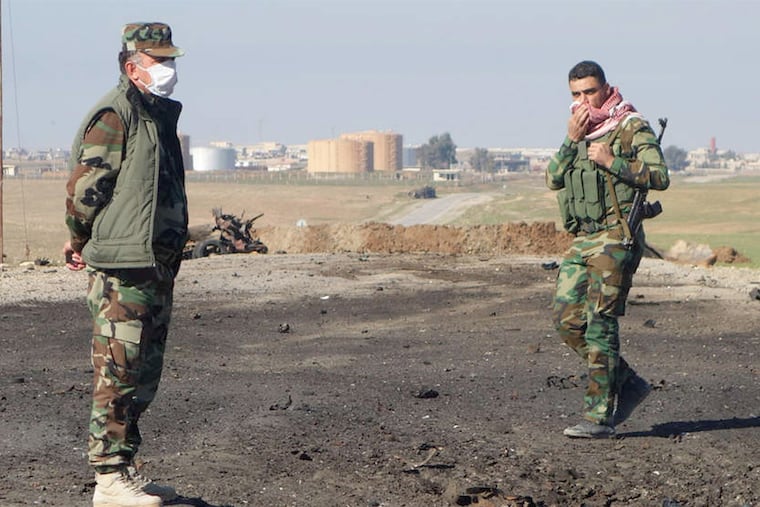ISIS chemical attack alleged
Kurdish authorities in Iraq say they have evidence of the use of chlorine gas in a January truck bomb attack.

BAGHDAD - Kurdish authorities in Iraq said Saturday they had evidence the Islamic State group used chlorine gas against peshmerga fighters, the latest alleged atrocity carried out by the extremist organization now under attack in Tikrit.
The allegation by the Kurdistan Region Security Council, stemming from a Jan. 23 suicide truck bomb attack in northern Iraq, did not immediately draw a reaction from the Islamic State group, which holds a third of Iraq and neighboring Syria in its self-declared caliphate. However, Iraqi officials and Kurds fighting in Syria have made similar allegations about the militants' using the low-grade chemical weapons against them.
In a statement, the council said the alleged chemical attack took place on a road between Iraq's second-largest city, Mosul, and the Syrian border as peshmerga forces fought to seize a vital supply line used by the Sunni militants. It said its fighters later found "around 20 gas canisters" that had been loaded onto the truck involved in the attack.
Video the council provided showed a truck racing down a road, white smoke pouring out of it as it came under heavy fire from peshmerga fighters. It later showed a white, billowing cloud after the truck exploded and the remnants of it scattered across a road.
An official with the Kurdish council told the Associated Press dozens of peshmerga fighters were treated for "dizziness, nausea, vomiting, and general weakness" after the attack. He spoke on condition of anonymity as he was not authorized to discuss the incident.
The Kurds say samples of clothing and soil from the site were analyzed by an unnamed lab in an unnamed coalition partner nation and were found to contain chlorine traces.
"The fact ISIS relies on such tactics demonstrates it has lost the initiative and is resorting to desperate measures," the Kurdish government said in the statement.
There was no independent confirmation of the Kurds' claim. Peter Sawczak, a spokesman for the Organization for the Prohibition of Chemical Weapons, which has monitored Syria's dismantling its chemical weapons stockpile, said his group had not been asked to investigate the attack.
Chlorine, an industrial chemical, was first introduced as a chemical weapon at Ypres in Belgium in World War I with disastrous effects as gas masks were not widely available at the time. Though chlorine has many industrial and public uses, as a weapon it chokes victims to death.
In the Syrian civil war, a chlorine gas attack on the outskirts of Damascus in 2013 killed hundreds.